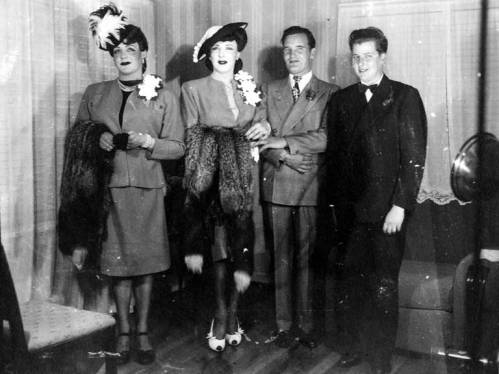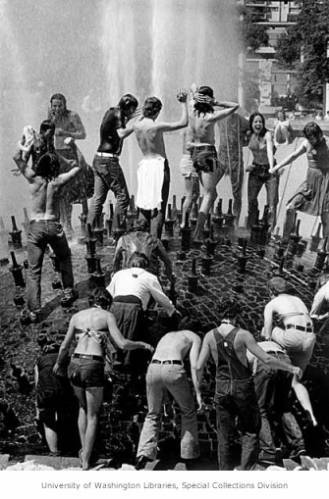Lesbian, Gay, Bisexual, Transgender, and Queer people have been visible and politically active in Seattle for generations. Their activism has yielded pioneering civil rights victories. This special section explores the history of the LGBTQ activism in Seattle and western Washington.The links above and below right lead to video oral histories with activists and introductory essays about key issues and communities. The project also serves as a gateway to the LGBTQ Special Collections and Archival Resources of the University of Washington Libraries.
See Tour the Project (right).
Introduction
by Kevin McKenna
Non-normative sexuality has long been part of the social fabric of Seattle. In the late 19th century, cases of sodomy were common in a city whose population included many transient men and relatively few women. The Washington State Legislature passed a bill making sodomy illegal in 1893. As the Alaska gold rush attracted more and more newcomers, there was increased publicity about homosexuality.
While documentation of homosexual behavior extends back into Seattle’s early history as an American city, the standard markers of a gay community did not come into being until the 1930s. Establishments serving gay or sexually curious clientele were predominantly located in Pioneer Square and Downtown. Gay men and women could go to bars and bathhouses in these areas without fear of being found out by employers or family members. The Double Header, considered by many to be the oldest continuously operating gay bar in the United States, opened its doors in 1934 and today continues to do business in Pioneer Square. The Garden of Allah was the first gay-owned establishment serving gay and lesbian Seattleites. It operated in downtown Seattle from 1946 to 1956.
Seattle’s first homophile organization, the Dorian Society, formed in1967, well after similar organizations had become active in Los Angeles, San Francisco, and New York. One theory is that the late start for homophile organizing had something to do with police practices; but in a way that may seem surprising. Physically violent policing of gay communities was common in the other three cities and gays created activist organizations in respone. But police in Seattle were more corrupt than violent. Payoffs by proprietors kept the level of violence down and with it the perceived need for a political response. As a result, homophile organizing only began when activists from other cities moved to Seattle.
Soon after the 1969 Stonewall riots in New York City symbolically launched the gay liberation movement in the United States, many Seattle activists adopted the discourse and tactics of gay liberation. The Seattle chapter of the Gay Liberation Front formed in 1970, and Seattle was one of a handful of cities to commemorate the first anniversary of the Stonewall riots. To this day, Seattle celebrates Gay Pride Week the same week as the Stonewall riots at the end of June along with New York, Chicago, and San Francisco. Seattle Counseling Services for Sexual Minorities began providing psychological services for gay men and lesbians in 1969. Seattle’s first Gay Community Center was founded in 1971. The Union of Sexual Minorities carried the ethos of gay liberation through the end of the 1970s, raising awareness around sexual discrimination as well as racism and imperialism.
While the gay community in Seattle was fairly gender integrated prior to the 1970s, with men’s bars, women’s bars, and mixed gender bars in operation in close proximity to each other in Pioneer Square, gay liberation was a predominantly male movement as many lesbian activists were more closely associated with feminist activism in the University District. The Gay Women’s Alliance formed in late 1970, articulating a new lesbian feminism. A Gay Women’s Resource Center was established at the University YWCA in 1971. Many lesbians joined socialist feminist organizations Radical Women and the Freedom Socialist Party, also based in the University District. In addition to these organizations, the Lesbian Mother’s Defense Fund was established in Seattle in 1974 to assist lesbian mothers in child custody cases. The organization aided the successful defense of Sandy Schuster and Madeleine Isaacson’s custody of their children when challenged by their former husbands.
The Seattle City Council was quicker than most municipal governments in acknowledging and passing protections for the gay community on the heels of gay liberation. The city adopted an employment nondiscrimination ordinance protecting sexual minorities in 1973 and a housing nondiscrimination ordinance in 1975.
Capitol Hill, which has long been a neighborhood where many gay people lived, became a more visible center in the 1970s as more and more venues including bars and bathhouses opened in Capitol Hill locations.
Following a wave of successful attempts to overturn protections for gay people at the ballot box in late 1977 and 1978, Seattle became the first city to democratically defeat such an initiative. 63 percent of the electorate in the city voted against Initiative 13, which would have overturned housing and employment nondiscrimination for sexual minorities. Citizens to Retain Fair Employment, the Seattle Committee Against Thirteen, and Women Against Thirteen mobilized voters from all over the city to defeat the initiative. King County adopted a county-wide employment nondiscrimination ordinance covering sexual minorities in 1985.
Beginning in 1979, Seattle became an early center of transgender activism with the founding of the Ingersoll Gender Center. The center continues to serve as a space for people to negotiate their own gender identities. The City of Seattle included “gender identity and expression” in its nondiscrimination ordinances in 1986, making it the sixth city in the country to do so. Queer activists further complicated the politics of gender and sexuality, arguing that one need not rigidly define their gender and/or sexuality beginning in 1990 with the founding of the Seattle Tribe of Queer Nation, which disbanded in 1995. King County adopted gender identity as a protected class in 2006 under the definition of “sexual minorities,” extending the county’s nondiscrimination protections for sexual minorities beyond county employees to cover other employers, labor organizations, and employment agencies. When the State of Washington added sexual minorities as a protected class in the state’s prohibition of discrimination in 2006, gender identity was included in the legal definition of sexual minorities statewide.
Seattle had its first AIDS diagnosis in November 1982. Through the Seattle Gay Clinic, which had been founded in 1979 as a safe space for STD testing primarily for gay men, a number of activists formed organizations to assist people with HIV/AIDS. The Seattle-King County Department of Public Health worked with the Northwest AIDS Foundation, the People of Color Against AIDS Network, and other organizations to promote safe sex and HIV antibody testing once that became available. Founded in 1985, the Department of Public Health’s AIDS Prevention Project was the second unit dedicated to HIV and AIDS in the country. Seattle’s HIV Vaccine Trial Unit, founded jointly by the Fred Hutchison Cancer Research Center and the University of Washington in 1987, was the first of its kind in the country. Also in 1987, King County prohibited discrimination against county employees with HIV/AIDS, a few months before the State of Washington adopted nondiscrimination language covering people with HIV And AIDS in the 1988 AIDS Omnibus Bill, the most sweeping legislation targetting HIV/AIDS by any state legislature to date.
In 1985, the Mayor’s Lesbian and Gay Task Force, under Mayor Charles Royer, identified domestic partnership as a means to equal benefits for gay Seattleites. The City of Seattle adopted domestic partnerships for the provision of equal benefits for municipal employees in 1994. King County adopted the same domestic partnership policy for county employees in 1995. In 2003, King County passed an ordinance requiring the equal provision of benefits for domestic partners as for spouses, covering employees of any company contracting with King County.
The Legal Marriage Alliance was founded in Seattle in 1995 as gay marriage had become an issue first in Hawaii. Since then, other gay rights organizations in the area have adopted marriage into their agendas, including Equal Rights Washington. A test case originating in King County reached the Washington State Supreme Court in 2005, and the court handed down a 5-4 decision against equal marriage for gay couples in 2006. The Washington State Legislature passed a marriage equality bill in February 2012, officially endorsed by the King County Counicl, which was then upheld with more than 53% of Washington State voters approving Referendum 74 in the November 2012 election.
A number of issues still face Seattle and King County’s LGBTQ communities. Even in King County, queer youth continue to face dispropotionate rates of homelessness, mental health issues, and domestic violence, and trans people are far more likely to live in poverty than cisgender people. Cases of violence against LGBTQ people have recently increased on Seattle’s Capitol Hill, long considered a safe neighborhood for lesbian and gay Seattleites. Organizations such as the Lambert House and the Gender Justice League continue to advocate for greater acceptance of LGBTQ people in our society, true freedom from discrimination and violence, and economic justice for the most marginalized members of our LGBTQ communities.


.jpg)


.jpg)